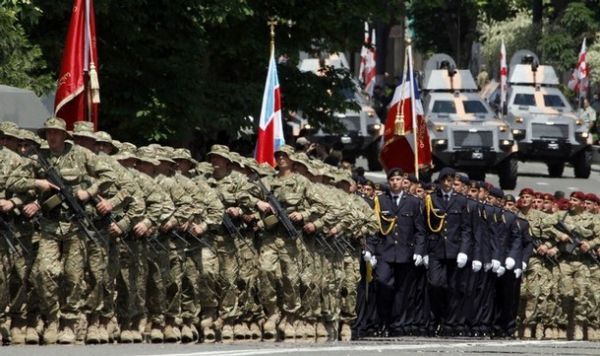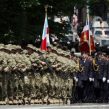
Georgia Reviews Results of Its Military Reform
Publication: Eurasia Daily Monitor Volume: 11 Issue: 21
By:

Following the United National Movement’s complete hand-over of power to the Georgian Dream coalition, experts in Georgia have begun assessing the results of the decade of rule by former president Mikheil Saakashvili and his team of young reformers, who were attempting to institute deep changes in all areas of public life.
An important aspect of this “Georgian Reformation” was military reform, which was implemented with mixed results since 2004, and accompanied by a frequent reshuffling of administrative personnel in the Ministry of Defense. For example, four separate defense ministers were nominated in 2004: David Tevsadze, Gela Bezhuashvili, Georgi Baramidze and Irakly Okruashvili.
Frequent ministerial changes were questioned by local experts and international partners, but they signified the president’s ongoing attempts to find an optimal model for implementing military reforms. Judging by the government spending at the time, Saakashvili considered military reform to be a high priority (https://www.ssrnetwork.net/document_library/detail/3567/georgian-defense-policy-and-military-reform; https://www.ogoniok.com/5047/2/; https://www.istpravda.ru/research/6871/). However, the five-day Georgian-Russian war of August 2008 revealed many mistakes made during the early phases of reform, which failed to boost the Georgian military’s effectiveness in the face of the Russian attack.
Throughout the reform process, an important task for the government was to overhaul the system of military management and top-level command. “In 2007, the General Staff of the Armed Forces transformed itself into a Joint Headquarters,” Irakly Aladashvili, the editor-in-chief of the independent military analysis journal Arsenali, and former defense ministry official, told Jamestown in an interview on January 17. According to Aladashvili, the idea behind this move was to approach the United States model of a senior military staff element comprised of the chiefs of the Army, Navy and Air Force. However, after 2008, Georgian authorities decided to entirely do away with the branches of the armed forces. “First, the Air Force was abolished as a separate entity; then the Navy followed. Only the ground forces remained,” Aladashvili said, thereby, undermining the goal of establishing a Joint Chiefs of Staff. Meanwhile, the idea of territorial defense, including the establishment of an eastern and western defense headquarters directly answerable to the Joint Chiefs of Staff, was not implemented. The corresponding changes are only planned in the constitution now.
Another key focus of the military reforms was implementing civilian oversight over the Armed Forces by a civilian-run Ministry of Defense, thus replacing Georgia’s Soviet system with a Euro-Atlantic model of defense, according to Nodar Kharshiladze, a former deputy defense minister, alumni of the National Defense University (NDU), and now a resident at the Georgian Foundation for Strategic and International Studies in Tbilisi (Author’s interview, January 17). According to the former official, many institutions introduced during the reforms were not known in the Soviet model, including mechanisms of horizontal planning. However, Georgia evidently lacked well-trained staff to tackle decentralization efforts, which are always difficult to implement for any army.
The Georgian army’s compatibility with North Atlantic Treaty Organization (NATO) forces was also a pressing issue for reform efforts. Both experts told Jamestown that the primary problem was not about the presence of Soviet and Russian weaponry in the Georgian army. “The type of military equipment is not the most important consideration for NATO,” Aladashvili noted. Kharshiladze pointed out that Georgia’s preoccupation with ridding its army of Soviet weapons systems was not driven by compatibility problems with the Alliance, but rather by Georgia’s strategic dependency on the countries of the former Soviet Union for repair, spare parts and ammunition. Indeed, according to Kharshiladze, the Georgian military’s participation in Western-led peacekeeping operations in Iraq, Kosovo and Afghanistan were more important for increasing its compatibility with NATO. That said, the West’s hesitation to sell arms to Georgia seriously impaired the country’s air defense and anti-tank capabilities, Kharshiladze said.
Indeed, serious shortcomings and contradictions in the military reform manifested themselves during Georgia’s brief war with Russia in August 2008. Georgia was not preparing its military for war with an adversary like Russia, Kharshiladze pointed out. “During peacekeeping operations, our military was being trained for combat actions against insurgents, but fighting an adversary with manifest military preponderance requires entirely different skills. We were not ready for this either theoretically or psychologically,” he noted. The former Georgian defense official said that he considered communications the single weakest spot in the Georgian army. “Our military had American systems of communications but could not make use of them. They simply did not know how to switch to another channel, when the Russians started to jam our radio waves,” Kharshiladze stated.
Other experts also pointed to problems with communications, blaming insufficient training time with the newly-purchased radio communications equipment. “Because of this,” deputy secretary of the National Security Council of Georgia, Tornike Turmanidze, told Jamestown on January 17, “the Georgian military and police often switched to mobile telephones to contact each other and their commanders during the active phase of the hostilities, which overloaded the mobile telephone network and hindered the timely delivery of intelligence and coordination of military actions.” The experience impelled the Georgian defense and internal affairs ministries to improve their radio communication systems. But more advice and assistance from Western partners is still needed, Turmanidze said.
After the August 2008 war, the training of reservists and their use during wartime became especially relevant. “Much money was spent on this, but the results were controversial,” Aladashvili noted. Kharshiladze, who personally oversaw the establishment of the military reserve system as the head of the defense ministry’s Department of Policies and Planning, concurred: Since 2004, “none of the models [for structuring the reserves] had succeeded so far.” He added, “The primary reason was that the reserves were routinely endowed with political functions. The army was well financed under President Saakashvili. Politicians did not get involved in military matters. But the reserves were often used for political ends” (Author’s interview, January 17).
Georgian officials in the new government intend to draw lessons from the previous iterations of military reform to make it a success. Aladashvili reckons that the new defense minister, Irakly Alasania, has taken steps in the right direction, including increasing civilian oversight of the armed forces, delineating key functions between the Ministry of Defense and the General Staff, as well as undertaking an effort to de-politicize the armed forces. If successful, these efforts will be instrumental in establishing a more effective mechanism for military management, upgrading the military training of personnel to the latest types of weapons, as well as increasing the compatibility of the Georgian army with NATO forces. Georgia has aspired to join the North Atlantic Alliance nearly since the country’s independence, and will continue to do so.




